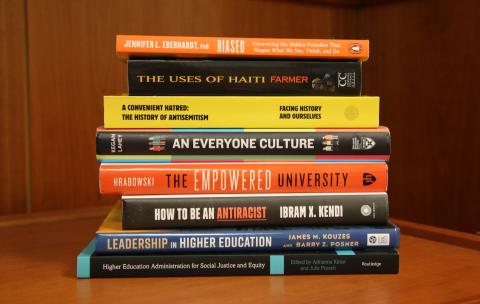
As part of a broad effort to promote diversity, equity and inclusion in the college, Dean Anthony S. Davis launched the anti-racist book share program in fall 2020 and offered to buy COLSA students, staff and faculty a book of their choice that confronts racism and white privilege and supports self-education and growth. To date, 58 people have received books.
Davis has also elevated the visibility of the college’s Inclusion, Diversity, Equity and Access (IDEA) Committee, with COLSA faculty adopting the committee as a standing committee in the bylaws, and he has created Open IDEA Hour sessions to discuss diversity, equity and inclusion ideas and concepts that emerge in teaching, research and the workplace. The monthly event is open to faculty and staff in COLSA’s community; a similar session for students will launch this fall.
COLSA: Why did you decide to launch the anti-racist book share?
Anthony S. Davis: One thing that crystallized for me following the killing of George Floyd was the urgent need to develop a meaningful pathway toward dismantling the seemingly intractable racism in society. I believe we have a responsibility to self-educate. We must build our competencies around racism and bias and learn how it can be hidden to some and so obvious to others. The anti-racism book share is an entry point intended to get people reading, thinking and talking about these things.
COLSA: Why do you think it’s important for us, both as individuals and as a community, to read and discuss these books?
Davis: The book share program is meant to build into our community a system of collective reading, sharing and exchange. I would like to see a group of faculty, staff and students get together and say, “We read these books, and now we recognize areas in our operations that we should really look at changing because they are at odds with our values as a college.”
COLSA: Of the books you’ve read on the subject of anti-racism, which would be first you’d recommend and why?
Davis: That’s a great question, and I don’t know. I think it’s a journey, and I want to emphasize that. For me, How to be an Anti-Racist — Ibram Kendi’s book — is one I think people can really identify with. White Fragility helps people have uncomfortable conversations, and I think that’s a good entry point for a lot of people. And then with each progressive book that’s read, you take the journey a little bit deeper.
COLSA: Can you isolate one thing that you’ve read or learned in the course of your reading that either particularly resonated with you or changed the way you think?
Davis: I think the level of discomfort that comes from knowing the cost of opportunities and how the cost has been born by those who have been systematically deprived of opportunities is a constant refrain in my mind. I also think about the wide-ranging age of the books we ordered and the persistent relevance of content that is in some cases decades old. It’s really hard to think about how resistant to change we have been as a society. It has reinforced my commitment to make sure that students have access to a transformative, inspiring education regardless of their financial background, their race, their identity.
COLSA: What do you want people to know about your vision for COLSA as it relates to inclusion, diversity, equity and access?
Davis: This college has people that care so deeply about both science and helping the world be a more inclusive place. My vision is to bring those together and daylight the possibility of science helping us to become a more equitable society. We can start here by creating a truly diverse, equitable and inclusive place of work and study. Then together, we address the grand challenges — economic disparity, food insecurity, human disease, climate change — that are lying in front of us.